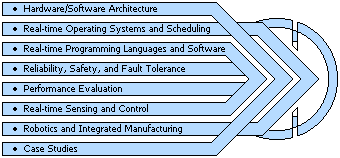|
|
|
 |
RTSS 2010
The 31st IEEE Real-Time Systems Symposium November 30 - December 3, 2010 San Diego, CA, USA |
| Important Dates (Year 2010) |
|
| May 16 | HARD deadline for paper submissions |
| Aug. 8 | Notification of acceptance |
| Oct. 29 | Hotel registration deadline, early conference registration deadline |
| Sept. 12 | Camera-ready deadline |
| Nov. 30 | Workshops |
| Dec. 1-3 | Symposium |
| Call for Papers |
|
Designing embedded real-time systems is becoming an increasingly important and difficult task due to the widespread applications, and increasing complexity of such systems, and the stringent constraints on reliability, performance, energy consumption, cost, and time-to-market. The objective of this track is to promote research on design and analysis, and verification of embedded real-time systems. It intends to cover the whole spectrum from theoretical results to concrete applications with an emphasis on practical and scalable techniques and tools providing the designers with automated support for obtaining high-quality software and hardware systems. A particular goal is to provide a forum for interaction between different research communities, such as scheduling, hardware/software co-design, and formal techniques. Topics of interest include (but are not limited to) the following:
|
|
||||